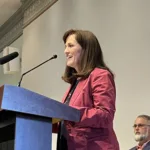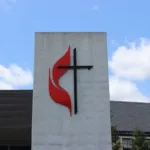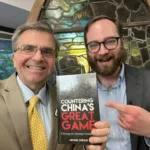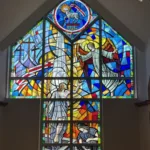In a recent Pew Research survey, Catholics are among the most divided when asked about religious and political convictions regarding Israel. A sometimes heated conversation in Washington, DC showcased this debate.
Dr. Faydra Shapiro, Dr. Gerald McDermott, Dr. Dirk Ansorge recently joined the Philos Project to offer differing opinions in a conversation titled “Catholic Approaches 2022: Whither Land and People of Israel in Catholic Doctrine.” Shapiro is the founder of the Israel Center for Jewish-Christian Relations and a Senior Fellow at the Philos Project. McDermott is a retired Anglican professor from Samford University, and Ansorge teaches dogmatics and the history of dogma at the Philosophisch-Theologische Hochschule Sankt Georgen. Shannon Walsh of the Philos Project moderated the debate.
The questions posed were numerous and sparked intense discussion. What are the different eschatological interpretations of Zionism in the eyes of the Catholic church? What are the theological justifications for the State of Israel? Does the Jewish state demand theological justification?
McDermott dove deep into the theory of the Eschaton in Israel, pulling from Scriptural evidence. He cited Matthew 19:28, Psalm 37:11, Acts 1:6, Luke 13, Luke 21, among other scriptures. He pointed out that the “immediate objection” is the Gospel of John’s declaration that true worship will not be limited to Jerusalem. He counters with Isaiah’s vision of an eschatologically-restored Jerusalem. “True worship will be everywhere, in spirit and in truth, and it will be centered in Jerusalem, in the Eschaton.”
“In sum, is there evidence for a future for the land of Israel in the New Testament?” McDermott asked. “There’s plenty; it’s plentiful. You see it in the Gospels, you see it all over Acts, you see it in the Epistles, you see it in Revelation. The land promise, the holiness of Jerusalem, the theological significance of the land of Israel in a future, probably the Eschaton. We do not see it, because we have been trained not to see it.”
Shapiro spoke on the Eschaton with fervor, calling the State of Israel “God-given.” She clarified that the state is not the fulfillment of the Eschaton, and therefore opens a question about how to celebrate the state: spiritually or patriotically?
In response, Ansorge doubted whether the Zionist political perspective was the perspective of the New Testament authors. McDermott answered that the evidence he presented is clear; although modern Israel is “not the telos of the Biblical prophecies, it’s a step on the way, and it’s a protection for the covenanted people that without the protection of that state, they will indeed, as they have been in the past, be gobbled up by their enemies.”
Walsh asked the speakers to discuss Israel as a sign of the Eschaton. McDermott believes it is, and he said that the scope and size of the “ingathering” of the Jews in Israel came from all four corners of the earth; that movement is cited often by Jewish Eschatological experts.
The debate shifted again when Ansorge and McDermott argued over the Palestinian question. Ansorge believes that the establishment of the Jewish State, regardless of the Eschaton, causes the persecution of the Palestinians. McDermott disagreed, pointing out that Palestinians have been historically intractable in accepting land offers from the Jews, specifically on four separate occasions. He also noted that Palestinians have full rights as citizens under Israeli law.
Shapiro reframed Ansorge’s opinion by asking if the official State of Israel automatically implies injustice to the Palestinians. She disagreed, saying that although there are costs to Jewish society and culture in the homogenization of society, she does not believe that the Israeli State must be a “costless development” in order to be legitimate.
Shifting to the political and religious intersection in modern Israel, Shapiro mentioned that many Israelis see the modern state as a “first flowering of our redemption” meaning a gradual emancipation, citing the common prayer “Our Father in heaven, Rock and Redeemer of Israel, bless the State of Israel, the first flowering of our redemption.”
Ansorge was skeptical, once again questioning the certainty of that assumption. Shapiro disagreed, saying it takes at “least as much audacity” to deny that modern Israel isn’t a gift from God, and to attribute it to a “mundane historical experience.”
Walsh asked the panelists how Catholics can address Jewish nationalism in a positive or neutral light. Ansorge was skeptical that Catholics could do so. He said that Jesus encourages disciples to look for “signs of the times” to ascertain biblical truth. Ansorge said one needs “concrete terminological criterion” to decide whether something is divinely given. Therefore, Catholics should look for reasoned evidence to support the State of Israel, and the evidence presented is not enough for him.
McDermott disagreed, warning against relying on the historical critical method to discern Jesus’s affirmation of Israel. He noted the Magisterium should dictate the church’s acceptance, and the Catholic believer must be careful to question “What is consistent with the Magisterium, and tradition in Scripture.”
Shapiro closed by reminding that to disengage with Israel’s heritage and the Jewish people, would be to disregard the Nostra Aetate which is the “Declaration on the Relation of the Church with Non-Christian Religions of the Second Vatican Council” signed in 1965. She concluded by calling Catholics to more discussion and more attention to Israel, rather than allowing themselves “to be stunned into silence because it’s so complicated.”






Comment by td on June 12, 2022 at 7:27 pm
Wow! This is pretty much an arcane “debate” between elitist people that have no official capacity in the Catholic Church. None of them are bishops or even priests, brothers, or sisters. This debate is certainly on a topic that Catholics are not even remotely thinking about. Engaged Catholics right now are focused on the impending schism in Germany, Roe vs wade, priestly child sex abuse, and the conflicting messages coming from the vatican. They aren’t thinking about Israel, and they aren’t pondering whether Israel should exist or not. They do not have the same “end times” thoughts that can be common in some evangelical circles. To be blunt (but hopefully still respectful), i am not convinced that juicy ecumenism has much of an idea about what is going on with Catholics or how the Catholic Church functions.
Comment by Stephen Goddard on September 20, 2022 at 8:30 am
Such a public debate can rarely be truly honest or fruitful, for the same reason that has existed since our Lord walked the earth – fear of the Jews. Certain terms have to be clarified before such a debate can proceed. First, the Jewish religion of today has to be clearly identified as not at all being the Hebrew religion of the old testament prophets, whom we honor and revere. At the arrival of Jesus, the Messiah, the true religion of the prophets, became Christianity. The old sacrifice of the temple became unnecessary and obsolete. The old religion was to be discarded, which was made clear by Christ’s foretelling of the destruction of the temple, which came to pass in 70AD. From that point in time until now, the old practice, obsolete though it may be, was not even possible as there was no temple and no priesthood. Rabbinical Judaism was born, which is basically a debating society with a lot of external rituals. Worse, it’s teachings are thoroughly contaminated with the false and blasphemous teachings about Christ and his Holy Mother. The modern state of Israel is not the Israel spoken of in the old testament, that Israel is the people of God who are committed to the apostolic faith, including Orthodox, Chaldean, Maronite, etc, as well as Roman Catholic. The modern state of Israel is not a miracle produced by God, it was founded by secular Jews and made possible by secular English government officials. It has been a constant source of suffering, misery and death in the world since the moment of it’s inception.